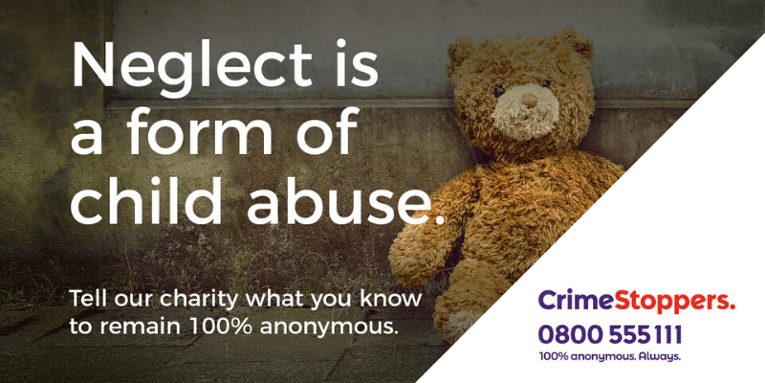Better to be safe than sorry if you believe a child is suffering

Fears of a surge in hidden cases of child neglect and abuse during the pandemic are behind our latest campaign to tackle child neglect.
Amid concerns of a tsunami of ‘hidden’ cases of children suffering from neglect and abuse during the pandemic, we’re warning it’s ‘better to be safe than sorry’, and calling for anyone with suspicions to speak up anonymously about their concerns.
Child abuse calls to the NSPCC have risen by 20% since the lockdown. This, combined with news of a worryingly low number of ‘at risk’ children attending schools that remain open for children of key workers and the vulnerable, has prompted fears of much higher levels of abuse happening behind closed doors than normal.
It’s estimated than 1 in 10 children have experienced neglect. That shocking figure is likely to increase significantly during the global pandemic and lockdown, as families who are already struggling face even more challenges in the current climate.
Neglect can include when a child is left hungry, their clothes are dirty or they are exposed to violence and danger in the home. Parents and carers have a legal duty to ensure the basics of child welfare are covered. Child neglect and abuse can leave life-long emotional and physical scars.
Find out more about the signs to spot and what you can do, right here on our website.
Ruth McNee, Crimestoppers Regional Manager, said: “A child or young person suffering neglect at this time must feel more isolated and alone than ever. Imagine being hungry, but there’s no food in the house, not knowing if you’ll be fed that day. Imagine not knowing when your parent or carer will come home, if at all, or if they’re drunk, high on drugs, abusive and angry. For some children and young people home is not a safe place.
“Abused children are at risk of being invisible during the pandemic. We know that people see and hear things that concern them about child welfare. Indeed, a shocking 1 in 10 children have experienced neglect.
“Maybe you are worried about a child’s welfare – a neighbour, friend or even relative - and fear they are suffering from neglect, but feel awkward and unsure about flagging it up to the authorities. Remember it’s better to be safe than sorry.
“Facing abuse in childhood can have a long-lasting negative impact into their adult life and impair their development and ability to achieve. Help is out there. If you suspect a child is being neglected but don’t want to give your details, you can always tell our charity whilst staying 100% anonymous. Use our simple and secure anonymous online form here on our website or call our UK Contact Centre, which is open 24/7, on freephone 0800 555 111. Your anonymous information could help make such a difference to a potentially abused or neglected child’s life.”
Find out more about the signs to spot and what you can do, right here on our website.
Amid concerns of a tsunami of ‘hidden’ cases of children suffering from neglect and abuse during the pandemic, we’re warning it’s ‘better to be safe than sorry’, and calling for anyone with suspicions to speak up anonymously about their concerns.
Child abuse calls to the NSPCC have risen by 20% since the lockdown. This, combined with news of a worryingly low number of ‘at risk’ children attending schools that remain open for children of key workers and the vulnerable, has prompted fears of much higher levels of abuse happening behind closed doors than normal.
It’s estimated than 1 in 10 children have experienced neglect. That shocking figure is likely to increase significantly during the global pandemic and lockdown, as families who are already struggling face even more challenges in the current climate.
Neglect can include when a child is left hungry, their clothes are dirty or they are exposed to violence and danger in the home. Parents and carers have a legal duty to ensure the basics of child welfare are covered. Child neglect and abuse can leave life-long emotional and physical scars.
Find out more about the signs to spot and what you can do, right here on our website.
Ruth McNee, Crimestoppers Regional Manager, said: “A child or young person suffering neglect at this time must feel more isolated and alone than ever. Imagine being hungry, but there’s no food in the house, not knowing if you’ll be fed that day. Imagine not knowing when your parent or carer will come home, if at all, or if they’re drunk, high on drugs, abusive and angry. For some children and young people home is not a safe place.
“Abused children are at risk of being invisible during the pandemic. We know that people see and hear things that concern them about child welfare. Indeed, a shocking 1 in 10 children have experienced neglect.
“Maybe you are worried about a child’s welfare – a neighbour, friend or even relative - and fear they are suffering from neglect, but feel awkward and unsure about flagging it up to the authorities. Remember it’s better to be safe than sorry.
“Facing abuse in childhood can have a long-lasting negative impact into their adult life and impair their development and ability to achieve. Help is out there. If you suspect a child is being neglected but don’t want to give your details, you can always tell our charity whilst staying 100% anonymous. Use our simple and secure anonymous online form here on our website or call our UK Contact Centre, which is open 24/7, on freephone 0800 555 111. Your anonymous information could help make such a difference to a potentially abused or neglected child’s life.”
Find out more about the signs to spot and what you can do, right here on our website.